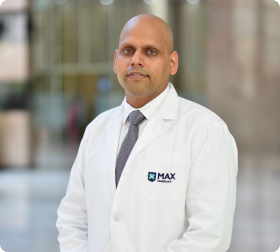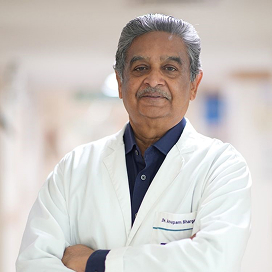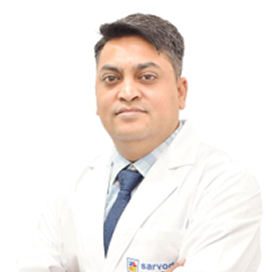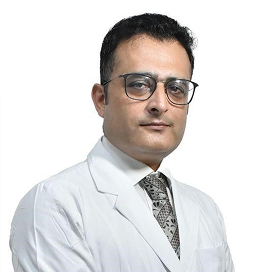Coronary Artery Bypass Grafting (CABG) Surgery
Coronary Artery Bypass Grafting (CABG) surgery, commonly known as heart bypass surgery, offers hope to individuals suffering from severe coronary artery disease. This procedure involves creating new pathways around blocked or narrowed arteries, ensuring the heart receives sufficient blood supply to function effectively.

The surgery typically uses a healthy blood vessel taken from the chest, arms, or legs to bypass the blocked area, improving blood flow to the heart. Universelle Medicaid is among the providers offering this life-saving service.
Why is CABG Required?
-
Severe Blockages: Patients with multiple artery blockages or main coronary artery obstructions.
-
Failure of Angioplasty: When stenting fails or arteries re-block (restenosis).
-
Diabetes with CAD: CABG is often preferred for diabetic patients with coronary artery disease.
-
Left Ventricular Dysfunction: Impaired heart function or prior heart attacks necessitating improved blood flow.
-
Post-Surgical Effects: Cataracts may develop after previous eye surgeries, such as glaucoma, retinal, or laser surgeries.
-
Emergency Situations: Excessive alcohol consumption, smoking, poor nutrition, and vitamin deficiencies can contribute to cataracts.
A thorough evaluation, including coronary angiography, echocardiograms, and stress tests, is conducted to determine eligibility. Physicians emphasize patient education about the procedure's benefits and risks.
Benefits of CABG Surgery
-
Symptom Relief: Alleviates chest pain and breathlessness, enabling a return to daily activities.
-
Increased Longevity: Improves survival rates and enhances the quality of life.
-
Active Lifestyle: Reduces symptoms, enabling patients to engage in physical activities and improve mental health..
Types of CABG Procedures
- 1 On-Pump CABG: Utilizes a heart-lung machine to temporarily take over heart and lung functions while the heart is stopped. Ideal for complex cases but may carry risks like stroke or cognitive issues.
- 2 Off-Pump CABG: Conducted while the heart continues to beat, using stabilizing devices to ensure precision. Often recommended for elderly or high-risk patients, it reduces complications and recovery time.
- 3 Minimally Invasive Direct Coronary Artery Bypass (MIDCAB): Involves a small incision on the chest, avoiding sternotomy. Suitable for single-vessel disease, it offers quicker recovery and less post-operative pain.
Risks and Complications
- Infections: Managed with stringent hospital protocols.
- Bleeding: Closely monitored, especially in patients with clotting disorders.
- Stroke or Heart Attack: Rare but possible, particularly in high-risk patients.
- Cognitive Issues: Temporary memory or focus problems may occur after on-pump CABG.
Recovery and Rehabilitation
- ICU Monitoring: Initial observation in the ICU for 1-2 days.
-
Hospital Stay: Typically 7 days if no complications arise.
- Rehabilitation: Structured exercise, dietary guidance, and lifestyle counseling to strengthen the heart and prevent future issues.
Universelle Medicaid provides personalized rehabilitation programs to support recovery.
Choosing the Right Hospital and Surgeon
Selecting a hospital and surgeon is crucial for successful CABG surgery. Indian hospitals like Apollo, Fortis, Medanta, and Max Hospitals offer state-of-the-art facilities and experienced cardiac surgeons. Factors to consider include:
-
Success rates
-
Availability of advanced technology
-
Comprehensive post-operative care
Cost of CABG Surgery
CABG surgery is significantly more affordable compared to Western countries, without compromising on quality. Costs vary based on the hospital, surgeon’s expertise, and specific surgical needs, making India a preferred destination for cardiac care.
Cardiac Surgeries cost are as follow
| Treatment | Cost Start From($) |
|---|---|
| Liver TranCABG Surgery/Heart Bypass Surgerysplant | 3800 - 6000 |
| CABG Minimal Invasive Surgery | 5800 - 7000 |
| Heart Valve Replacement (MVR/AVR) | 7100 - 8000 |
| Heart Transplant | 60500 |
Frequently Asked Questions(FAQ's)
Important Notes
-
Prices are subject to change or withdrawal without notice.
-
These prices are indicative and may vary depending on the patient's condition at the time of admission.
-
A final estimate will be provided upon the patient's admission.
TREATMENTS
Cardiac Treatment Surgery

Coronary ArteryBypass Grafting Surgery
Coronary Artery Bypass Grafting (CABG) surgery, commonly known...
More Information
Aortic Valve Replacement Surgery
Aortic valve replacement (AVR) surgery is a leading treatment for...
More Information
ASD/VSD Closure Surgery
The heart's septum is a wall that separates its chambers,...
More Information
Cardiac Tumors in Children
Cardiac tumors in children are abnormal cell growths within the...
More Information
Cardiac Ablation Surgery
Cardiac ablation surgery is a specialized medical procedure...
More Information
Cardiac Tumor Treatment
Cardiac tumors are abnormal growths of irregularly dividing cells in...
More Information
Coronary ArteryBypass Grafting Surgery
Coronary Artery Bypass Grafting (CABG) surgery, commonly known...
More Information
Aortic Valve Replacement Surgery
Aortic valve replacement (AVR) surgery is a leading treatment for...
More Information
ASD/VSD Closure Surgery
The heart’s septum is a wall that separates its chambers,...
More Information
Cardiac Tumors in Children
Cardiac tumors in children are abnormal cell growths within the...
More Information
Cardiac Ablation Surgery
Cardiac ablation surgery is a specialized medical procedure...
More Information
Cardiac Tumor Treatment
Cardiac tumors are abnormal growths of irregularly dividing cells in...
More InformationDoctors
Our Specialist Doctors

Dr. Shashank Chaudhary
Surgical Oncology, Cancer Care


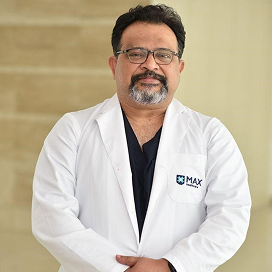
Dr. Vijayant Devenraj
Cardiac Surgery (CTVS), Thoracic


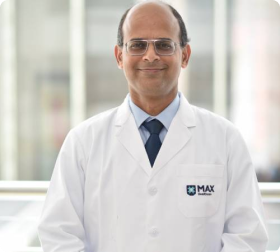
Dr. PrasoonKant Shamshery
Orthopaedics & Joint Replacement


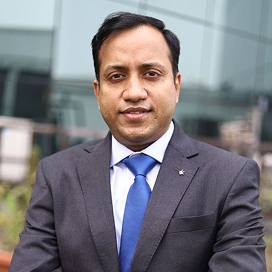
Dr. Vikas Singla
Senior Director & Head – Gastroenterology (Pancreatic-Biliary, Luminal Gastroenterology & Endoscopy Division)


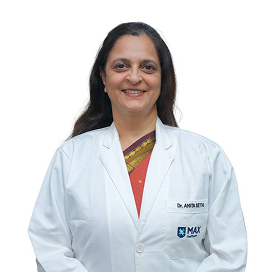
Dr. Anita Sethi
Principal Director & HOD - Ophthalmology (Max Panchsheel & Max Saket)


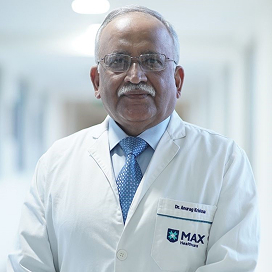
Dr. Anurag Krishna
Chairman - Paediatrics & Paediatric Surgery Paediatric (Ped) Surgery, Paediatric (Ped) Urology



Dr. Bipin Walia
Vice Chairman & Head- Neurosurgery for Max Saket Complex & Vice Chairman- Neurospine, Max Saket


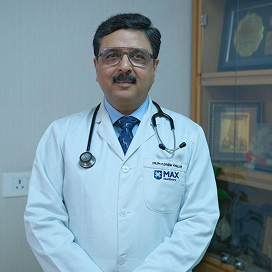
Dr. Dinesh Khullar
Chairman - Nephrology & Renal Transplant Medicine, Max Saket Complex


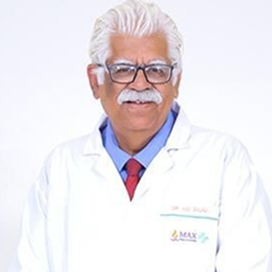
Dr. H.N. Bajaj
Principal Director (Orthopaedics) & Head (Spine Surgery) Orthopaedics & Joint Replacement, Spine Surgery, Arthroscopy & Sports Injury


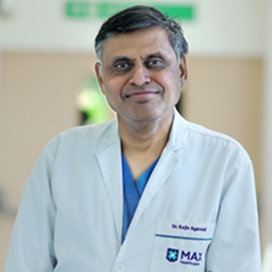
Dr. Harit Chaturvedi
Chairman - Max Institute of Cancer Care Cancer Care / Oncology, Thoracic Oncology, Surgical Oncology, Robotic Surgery, Head & Neck Oncology, Breast Cancer


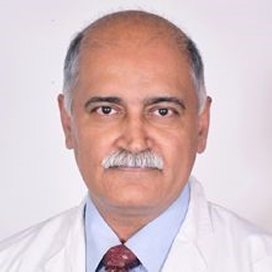
Dr. Kulbhushan Singh Dagar
Principal Director, Chief Surgeon & Head - Neonatal & Congenital Heart Surgery Paediatric (Ped) Cardiac Surgery, Cardiac Sciences, Paediatrics (Ped)



Dr. Pradeep Chowbey
Chairman - Max Institute of Laparoscopic, Endoscopic, Bariatric Surgery & Allied Surgical Specialities



Dr. Sunil Choudhary
Principal Director & Chief of Plastic Surgery (Max Institute of Reconstructive, Aesthetic, Cleft & Craniofacial Surgery (Miracles) Aesthetic And Reconstructive Surgery



Dr. Abhishek Mishra
MBBS, MS - Orthopaedics Orthopedic surgeon, Joint Replacement Surgeon


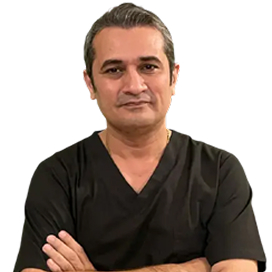
Dr. Vineet Malhotra
MBBS | MS – General Surgery | DNB – Urology/Genito – Urinary Surgery



Dr. (Lt Col) Ashok Kumar
Senior Consultant & Head - Radiation Oncology



Dr. Aman Jyoti
Senior Consultant – Paediatrics Cardiac Anaesthesia & Cardiac Intensive Care



Dr. Amit Kumar
Associate Director & Head (Unit I) - Interventional Cardiology



Dr. Anushtup De
Senior Consultant & Head (Unit l) - General & Minimally Invasive Surgery


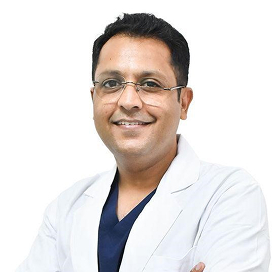
Dr. Arjun Goel
Senior Consultant & Head (Unit II)- General & Minimally Invasive Surgery


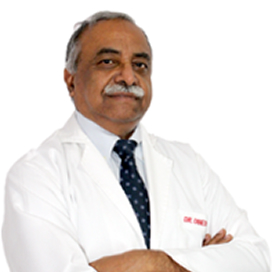
Dr. Dinesh Pendharkar
HOD & Director - Medical Oncology, Cancer Care, Haematology & BMT



Dr. Subhash Hakoo
HOD & Director - General & Minimally Invasive Surgery



Dr. Sujoy Bhattacharjee
HOD & Director - Robotic Joint Replacement



Dr. Tanmay Pandya
HOD & Director - Nephrology & Renal Transplantation



Dr. Ved Prakash
Senior Consultant & Head - Cardiothoracic & Vascular Surgery



Dr. Anuj Agrawal
Sr. Consultant Department of Orthopaedics & Joint Replacement



Dr. Ashwini Kumar Singh
Senior Consultant & Head Plastic, Reconstructive & Cosmetic Surgery



Dr. Nikhil Gupta
Orthopaedics, Arthroscopy & Joint Replacement Surgery



Dr. Sparshi Jain
Consultant in Department of Ophthalmology



Dr. (Maj) Ravi Shankar
Consultant - Haemato-Oncology & BMT MBBS, MD (Pediatrics) Fellowship PHO & BMT



Dr. Amrita Tiwary Vyas
Consultant, Neurosciences/Neurosurgery, Brain & Spine Specialist



Dr. Ankit Agrawal
Consultant, Neurosciences/Neurosurgery, Brain & Spine Specialist


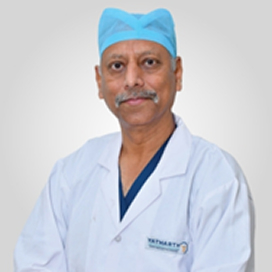
Dr. Sudhir Sharma
Director - Minimal Access, Robotic, Bariatric and General Surgery, MBBS, MS, MBA, FIAGES, FICLS



Dr. Sujoy Bhattacharjee
HOD & Director - Robotic Joint Replacement


Book Appointment
Complete the form below to schedule your appointment.
Begin Your Health Treatment Journey with Us
By utilizing our services, you'll find it easier to improve your well-being and feel better."
Consult Now


